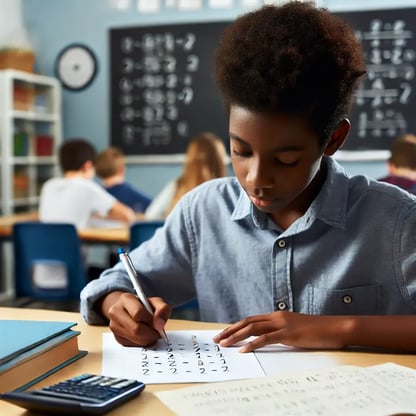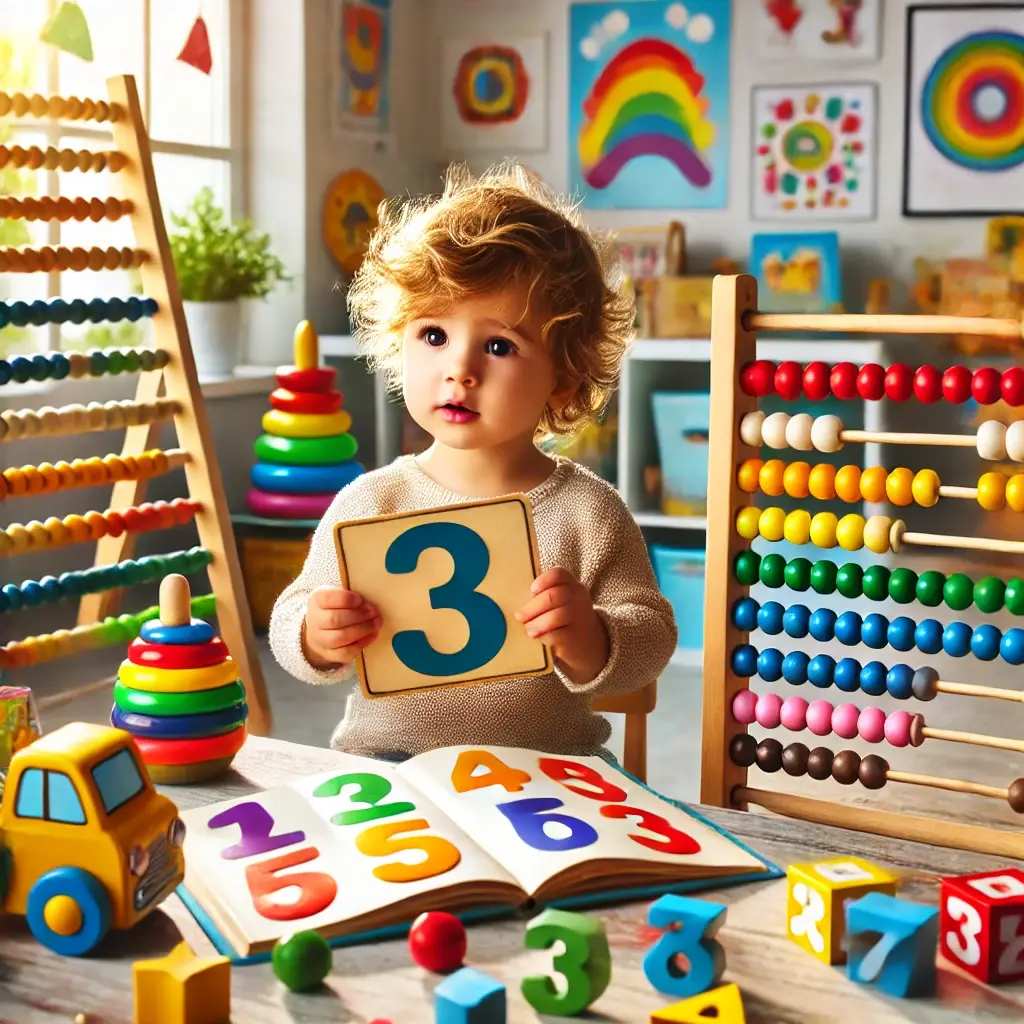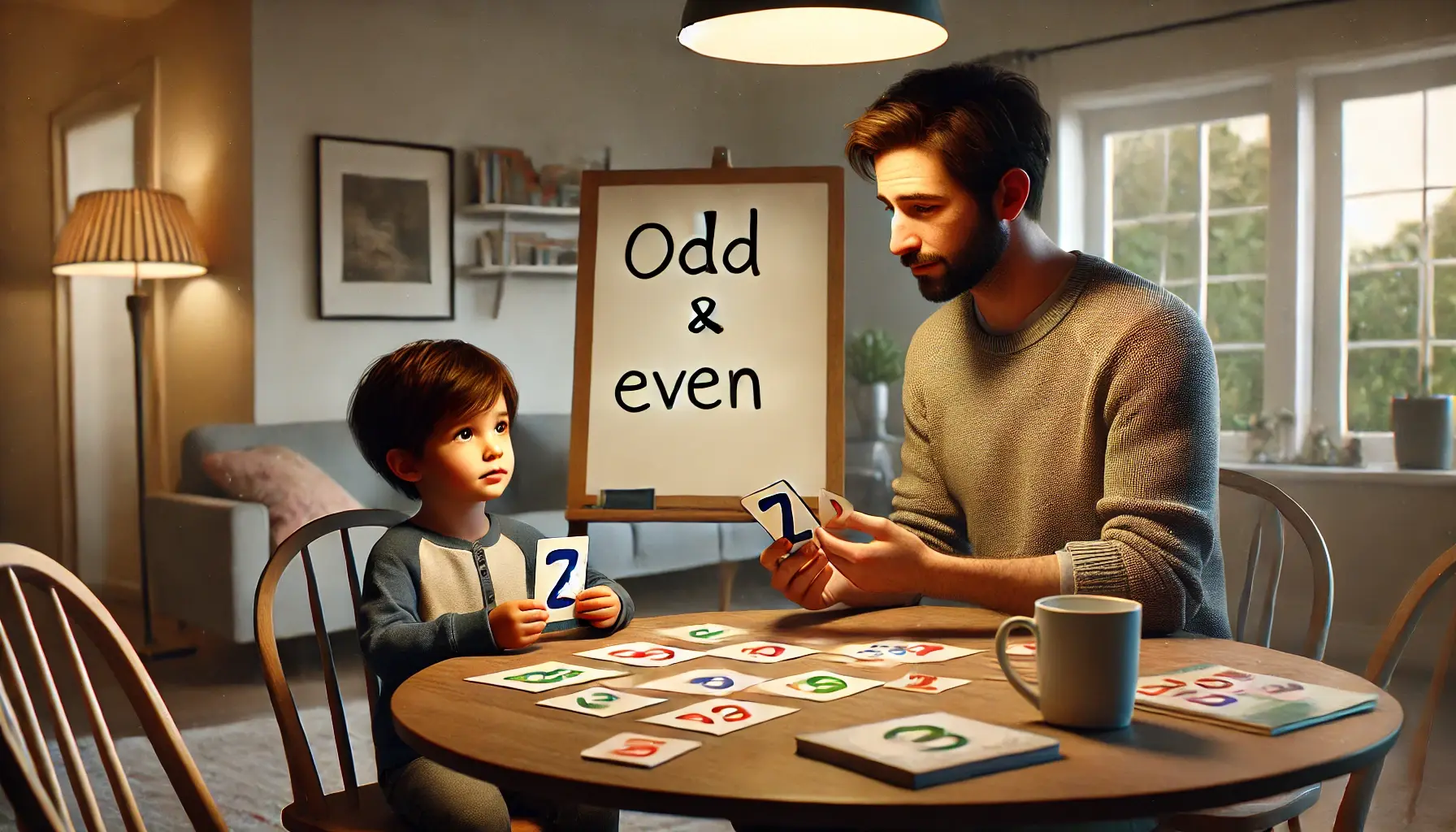
What do 5th graders learn in math? In Fifth grade, students focus on mastering whole numbers, fractions, and decimals through addition, subtraction, multiplication, and division. They explore integers, introducing the concept of positive and negative numbers, and work with larger numbers to strengthen their computational skills. Math for 5th graders learn to solve expressions and equations using variables and mathematical symbols, expanding their problem-solving abilities.
In Fifth grade, geometry, fractions, decimals, and basic data interpretation become key areas of focus. These topics help students build a strong foundation for middle school math. This year, math becomes more challenging and essential, equipping students to think critically and tackle complex problems with greater efficiency.
If you're wondering what math do you learn in 5th grade, this guide, we’ll walk you through the key math topics your 5th grader will learn, giving you insight into their curriculum and equipping you with the knowledge to help them succeed at home.
What Do 5th Graders Learn in Math and 10 Essential Math Skills
1. Integers
At this grade level, students will begin associating whole numbers with the term "integer." This is a significant concept because integers are not limited to positive numbers; they also include negative numbers, which will become more prominent in later math education. In fifth grade math, your child will be introduced to the word "integer" to help them understand that numbers can extend below zero. This introduction lays the groundwork for understanding positive and negative values, which will be crucial in future topics like algebra.
Throughout 5th grade, students will work on understanding integers in the context of number lines, learning to place positive and negative numbers about zero. This foundational knowledge prepares them for more advanced mathematical discussions and problem-solving in middle school, where they’ll encounter integers in various forms, such as operations and equations.
2. Multiplication

In earlier grades, your child learned the basics of multiplication and built a strong foundation in their times tables from 1 to 9. In 5th grade math, multiplication becomes more complex as students are introduced to multi-digit multiplication problems. They will begin by multiplying two-digit numbers by one-digit numbers, progressing to more challenging tasks like multiplying three-digit numbers by one-digit numbers.
As the year advances, students will tackle multiplying two-digit numbers by two-digit numbers and even three-digit numbers by two-digit numbers. By the end of 5th grade, your child will be able to solve multiplication problems involving up to three places and with multiple numbers in the problem, such as multiplying numbers like 324 x 56 or 456 x 123. This expansion of multiplication skills helps students develop a deeper understanding of number relationships and prepares them for future mathematical concepts like division and fractions.
3. Division
As you might expect, fifth grade math introduces more complex division problems that challenge students to apply their basic division knowledge in new ways. Your child will practice completing word problems involving division, often with remainders in the answer. These problems help develop critical thinking skills as they work through real-world scenarios, requiring them to divide and interpret results.
In 5th grade math, students will get plenty of practice with long division, starting with dividing three-digit numbers by one-digit numbers. As they grow more confident, they will begin dividing larger numbers by two-digit numbers, pushing their understanding of division to a more advanced level. By mastering these skills, your child will be well-prepared for the more intricate division problems they will encounter in future grades, including decimals and fractions.
4. Expressions
In 5th grade, one of your child's big steps in math is learning how to solve expressions and equations. A key part of this is understanding the order of operations, which is just the correct order to solve different parts of a math problem. Their teachers (or coaches) and textbooks will guide them through how to follow these steps so they can get the right answer every time.
Your child will also start writing their expressions using variables (letters representing numbers), a new and exciting skill. They'll learn how to solve these expressions using the order of operations, making math feel like solving a puzzle.
On top of that, math for 5th graders will start working with input/output tables. These tables help kids see how numbers and variables are related, making it easier to understand expressions and equations. By the end of the year, your child will feel much more confident about handling these new math skills.
5. Solving with Decimals

In fifth grade math, your child will take on the challenge of working with decimals. One of the first things they’ll learn is comparing decimals with fractions and determining if they’re equivalent. Using number lines, they’ll understand where decimals and fractions fall in order, helping them see the connection between the two.
They’ll also get lots of practice with decimal addition and subtraction, which helps build confidence when working with these smaller, more precise numbers. Rounding decimals is another key skill they'll learn, along with dividing decimals and solving word problems that include decimals. By working through these activities, your child will understand decimals and how they fit into the bigger picture of math.
6. Converting Decimals and Fractions
In 5th grade math, one important skill your child will master is converting fractions into decimals and vice versa. This skill helps them see the relationship between these two types of numbers and how they can be used interchangeably. With the help of their teachers and textbooks, your child will learn simple methods to understand how decimals and fractions are connected.
By practicing this conversion, they’ll gain a deeper understanding of both concepts, making solving more complex problems much easier.
7. Fractions
In 5th grade, your child will explore more fractions with lots of new lessons and practice. They’ll start by working on familiar concepts like simplifying fractions, converting improper fractions into mixed numbers (and the other way around), and finding equivalent fractions. They’ll also learn how to find the greatest common factor (GCF) and least common multiple (LCM), which help make fractions easier to work with.
They’ll then move on to adding and subtracting fractions with both like and unlike denominators, and they’ll also learn how to handle mixed numbers with unlike denominators. These skills will give them a solid foundation for working with fractions in everyday math.
On top of that, math for 5th graders will take on new challenges like multiplying fractions by fractions, multiplying fractions by whole numbers, and even dividing fractions by whole numbers—and vice versa. These new skills will help your child become a fraction pro and ready for more advanced math in the future!
8. Coordinate Planes

In 4th grade, your child got a brief introduction to the coordinate grid, but in fifth grade math, they’ll develop a much more detailed understanding of the coordinate plane and how it’s used in math. They’ll review ordered pairs and learn how to plot them on a coordinate plane, and this year, they’ll also begin to explore the four quadrants: Quadrant I, Quadrant II, Quadrant III, and Quadrant IV.
By working with all four quadrants, your child will better understand how the coordinate plane can be used to solve various math problems. This skill will help them plot points and make important connections between numbers and their locations on a grid, preparing them for more advanced topics in future math classes.
9. Geometry
In 5th grade math, geometry becomes more exciting as your child learns to describe and understand different shapes using terms like polygon, quadrilateral, and parallelogram. They’ll explore more shapes with a specific number of sides and learn how to calculate important measurements like perimeter and area.
A new concept introduced in 5th grade is finding the volume of three-dimensional shapes. This adds another layer to their geometry skills, helping them understand how to measure the space inside objects like cubes and rectangular prisms. By the end of the year, your child will have a solid grasp of two-dimensional and three-dimensional geometry concepts.
10. Metric and Customary Measurement
In 5th grade, your child will be introduced to customary and metric measurement systems. They’ll learn about different units for measuring capacity and length in each system. By the end of the year, they’ll know how to convert between these measurements, whether inches to centimeters or gallons to liters.
If you're wondering what math should a 5th grader know, these 10 essential skills form the core of their learning and prepare them for middle school math.
Assisting Your Kid With Math for 5th Graders Near You at Genie Academy
Genie Academy is a trusted tutoring center in New Jersey, offering both online and in-person support for your 5th grader. If you are looking for a 5th grade math tutor, we can help your child excel in all core subjects, including math, abacus, reading, writing, and coding. Our expert tutors have years of experience and use fun, engaging activities to keep 5th graders interested, and motivated, while they learn.
We pride ourselves on offering small class sizes, making it easier for your child to focus and receive the attention they need to excel in math and other subjects. After completing our tutoring programs, many of our 5th-grade students see significant improvements in their math skills. Not only do we cover the topics your child is learning in school, but we also go beyond the curriculum, giving them a deeper understanding and helping them stay ahead.
Our locations include East Brunswick, Hillsborough, Marlboro, South Brunswick, Plainsboro, Woodbridge, and South Plainfield, New Jersey.
How To Get Better at 5th Grade Math?
Here’s how to get better at math in 5th grade:
- Practice Regularly: Set aside time for daily or weekly math practice, whether it’s solving homework problems or playing math games. Consistent practice reinforces classroom learning.
- Make Math Fun: Use real-life activities like cooking to practice measurements or grocery shopping to work on addition, subtraction, and multiplication. Many apps and online games turn math into an enjoyable activity.
- Encourage a Positive Attitude: Remind your child it’s okay to make mistakes. A positive mindset boosts confidence and makes learning easier.
- Focus on Understanding, Not Memorization: Help your child grasp the "why" behind math concepts by asking them to explain their thinking and work through problems step by step.
- Explore Different Learning Methods: Some children thrive with traditional methods, while others benefit from digital tools. Find the approach that works best for your child. The Math Curriculum Impact Study highlights the importance of exploring various approaches to learning. This large-scale study tested the effectiveness of a digital math curriculum for 5th graders, but the results showed no significant difference in achievement compared to traditional methods.
- Consider Extra Support: Tutoring programs like Genie Academy provide personalized guidance in small classes, helping students excel in math and beyond.
Conclusion About Mastering Fifth Grade Math Near You
Fifth grade is an important year for your child's math journey. From exploring geometry and fractions to mastering decimals and equations, your child is learning skills that form the foundation for future success. If you are wondering what do 5th graders learn in math, what math do you learn in 5th grade, or what math should a 5th grader know, these core concepts are essential.
As a parent, you can support their progress by practicing math together, making it fun, and focusing on understanding the concepts. If your child needs extra help, there are tutoring centers like Genie Academy that offer personalized support. With small class sizes and experienced tutors, these programs go beyond the school curriculum, helping kids build confidence and excel in math.





